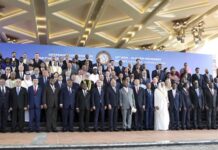Group of Seven leaders are pledging to donate hundreds of millions of doses of COVID-19 vaccines to poorer countries around the world.
United Nations chief Antonio Guterres criticised wealthy nations in February, saying distribution was “wildly uneven and unfair” and warning against so-called “vaccine nationalism” and “vaccine hoarding”.
WHO Director-General Tedros Adhanom Ghebreyesus has said the pandemic is being perpetuated by a “scandalous inequity” in vaccine distribution.
The commitments are also seen as an effort to counter China, which is one of the world’s biggest economies, but is not part of the G7.
China has shipped vaccines to 66 countries in the form of aid, according to state news agency Xinhua, and has also pledged to supply 10 million doses to COVAX which is backed by the Global Alliance for Vaccines and Immunization (GAVI) and the World Health Organization (WHO).
COVAX aims to secure two billion vaccine doses for lower-income countries by the end of 2021.
Before the new pledges this week, only 150 million doses had been promised to COVAX, far short of the 250 million needed by the end of September.
Below are the G7 pledges so far:
United States
US President Joe Biden plans to buy and donate 500 million doses of the Pfizer coronavirus vaccine to more than 90 countries. He has also called on the world’s democracies to do their part to help end the pandemic.
US drugmaker Pfizer and its German partner, BioNTech, will provide 200 million doses in 2021 and 300 million doses in the first half of 2022, which the United States will then distribute to 92 lower-income countries and the African Union.
The Pfizer-BioNTech vaccine requires two doses and has to be stored in extremely low temperatures.
United Kingdom
British Prime Minister Boris Johnson has said that “the G7 will pledge to distribute vaccines to inoculate the world by the end of next year, with millions coming from surplus UK stocks.”
The UK has mainly used the two-shot AstraZeneca vaccine for its population, which was developed with the University of Oxford.
The UK says that G7 leaders are expected to agree to provide one billion doses via dose sharing and financing to end the pandemic in 2022.
Johnson has pledged to donate at least 100 million surplus coronavirus vaccine doses within the next year, including five million beginning in the coming weeks.
The AstraZeneca vaccine, which is cheap and easy to transport, is a key component of the COVAX programme.
EU – including Germany, France and Italy
European Commission President Ursula von der Leyen has said the European Union aims to donate at least 100 million COVID-19 vaccine doses to low- and middle-income countries by the end of 2021.
That includes a promise by France and Germany to donate 30 million doses each, with Italy donating 15 million doses.
France has also said it has donated 184,000 doses of AstraZeneca’s COVID-19 vaccine to Senegal through the COVAX vaccine-sharing programme.
Japan
Japan has said it will donate about 30 million doses of vaccines produced within the country through COVAX.
Last week,Japan delivered 1.24 million doses of AstraZeneca’s vaccine to Taiwan for free.
Taiwan, which emerged from the first year of the pandemic relatively unscathed, is battling an outbreak that began last month.
Canada
The Reuters news agency has reported that Canada is in talks to donate excess doses through COVAX, although it has not yet made public any firm commitment of donations, or said how much it plans to donate.
SOURCE: AL JAZEERA, REUTERS





